Panduan Lengkap Prebiotik

Contents
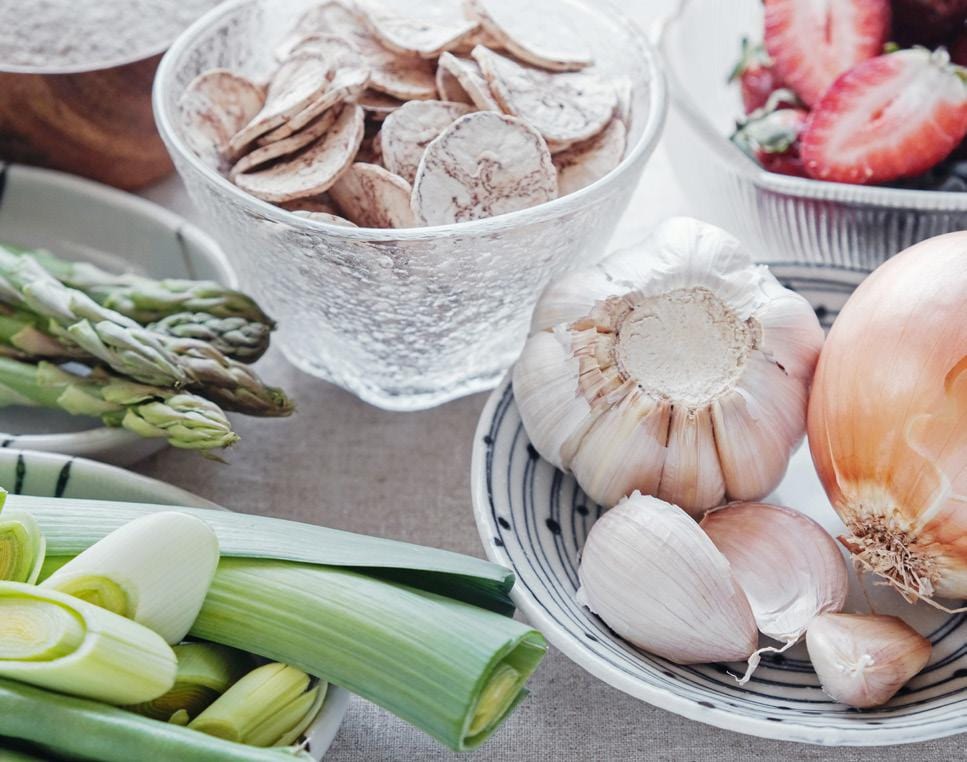
Prebiotics are a special category of nutrients that feed the microorganisms in your gut microbiome[1].
They occur naturally in healthy foods like fruits and vegetables and are also available in supplement form.
While most people are aware that probiotic foods and supplements providing beneficial bacteria have gut health benefits, research suggests it’s possible that eating the right type of prebiotics to nourish your gut flora could be equally important for supporting a healthy microbiome[1].
In this in-depth guide, you’ll learn everything you need to know to understand, choose, and use prebiotic foods and supplements effectively to support gut health, including:
What are Prebiotics?
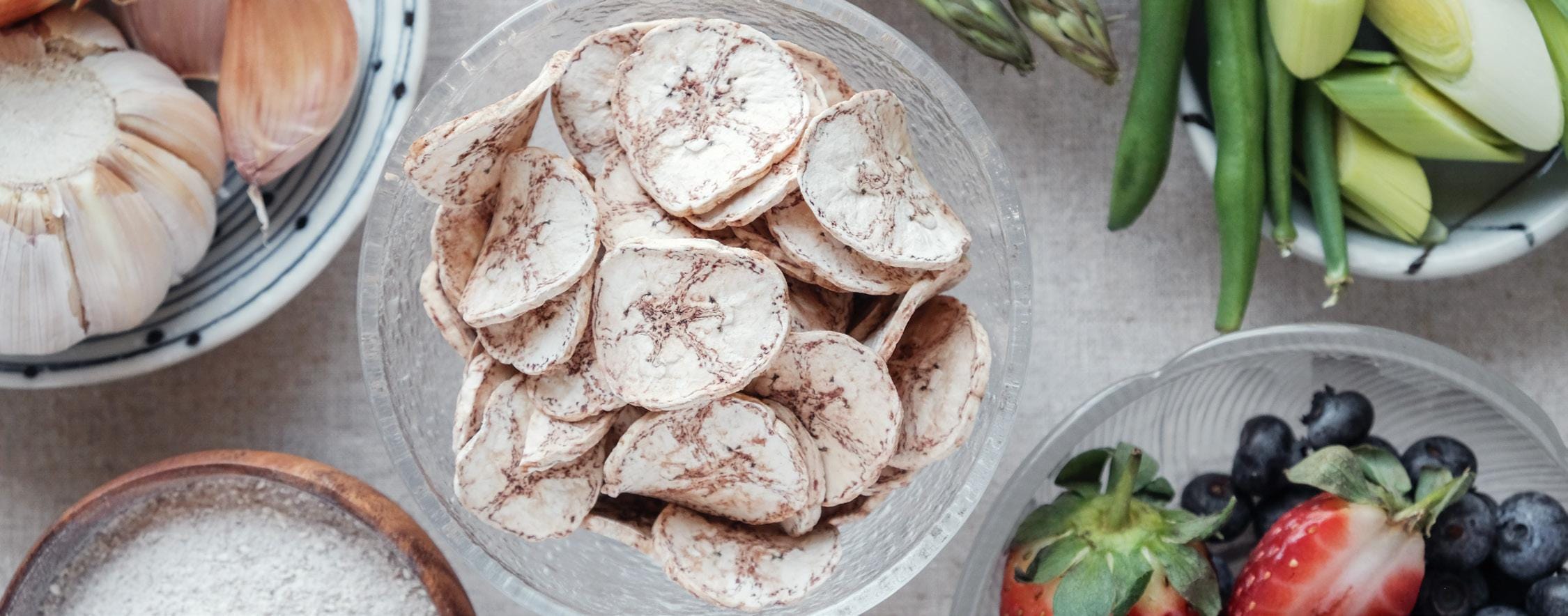
Simply stated, prebiotics are compounds that support the growth of beneficial bacteria or other living organisms in your gut that benefit your health[1].
The first use of the term prebiotics dates back to 1995[1][2].
More recently, in 2008, the International Scientific Association of Probiotics and Prebiotics (ISAPP) defined “dietary prebiotics” as
“a selectively fermented ingredient that results in specific changes in the composition and/or activity of the gastrointestinal microbiota, thus conferring benefit(s) upon host health”[3].
This concept is not to be confused with probiotics, which are the living microorganisms found in foods and supplements that can be incorporated directly into yourmicrobiome.
Unlike probiotics, prebiotics are not living orgasms. Instead, you can think of them as the “food” or nutrients that your gut bacteria need to thrive.
Most prebiotics, but not all, fall into the category of naturally occurring soluble dietary fiber. In other words, not all dietary fiber has prebiotic properties, but most prebiotics are fiber.
The Different Types of Probiotics
Examples of common fiber-type prebiotics and their sources include[1]:
- Inulin-type fructans (ITFs), oligofructose, or fructooligosaccharides (FOS) including inulin and agavins, found in foods including asparagus, garlic, leek, onion, Jerusalem artichoke, and chicory roots[4].
- Arabinogalactans, a type of polysaccharide found in plants including leek seeds, radish, carrots, pears, tomatoes, and traditional medicinal herbs including echinacea and turmeric[5].
- Pectin from many fruits and vegetables,
- Resistant starch, which occurs naturally in plantains, green bananas, and some legumes, and is a portion of most starchy foods,
- Galactooligosaccharides (GOS) or milk oligosaccharides found in mammal milk, including human breast milk,
- Guar gum, a gel-forming galactomannan made from the endosperm of the plant Cyamopsis tetragonolobus (guar or cluster bean) and composed primarily of high molecular weight polysaccharides[6], and
- Isomaltooligosaccharides (IMOs), manufactured glucose monomers linked during enzymatic treatment of corn starch with alpha-amylase, pullulanase, and alpha-glucosidase and consisting primarily of isomaltose, isomaltotriose, and panose[6].
Initially, researchers thought that all prebiotics came from dietary fiber, but newer studies have shown that a few other types of compounds found in food can also support healthy gut bacteria and should also be considered prebiotics[7].
Non-fiber prebiotics include polyphenols (a type of antioxidant found in green tea and many plant foods) and lactulose, a type of milk sugar[8][9].
How Do Prebiotics Work?
Because all prebiotics are resistant to being broken down and digested in your stomach and small intestine, they reach the colon largely intact[10].
Inside your colon, prebiotic foods and supplements are metabolised, broken down, and fermented by resident bacteria, at which point they’re converted to other compounds with health benefits[10].
The byproducts of this metabolic process, which include short-chain fatty acids (SCFAs) like acetate, butyrate, and propionate as well as peptidoglycan, appear to have beneficial effects including anti-inflammatory and immune system modulating effects[10].
Prebiotics can also change the composition of your microbiome, most often by supporting beneficial strains and suppressing pathogenic ones. By changing the composition of your gut flora, prebiotics you consume can also influence your metabolism, gut integrity, neurotransmitter production, and other aspects of your health[11].
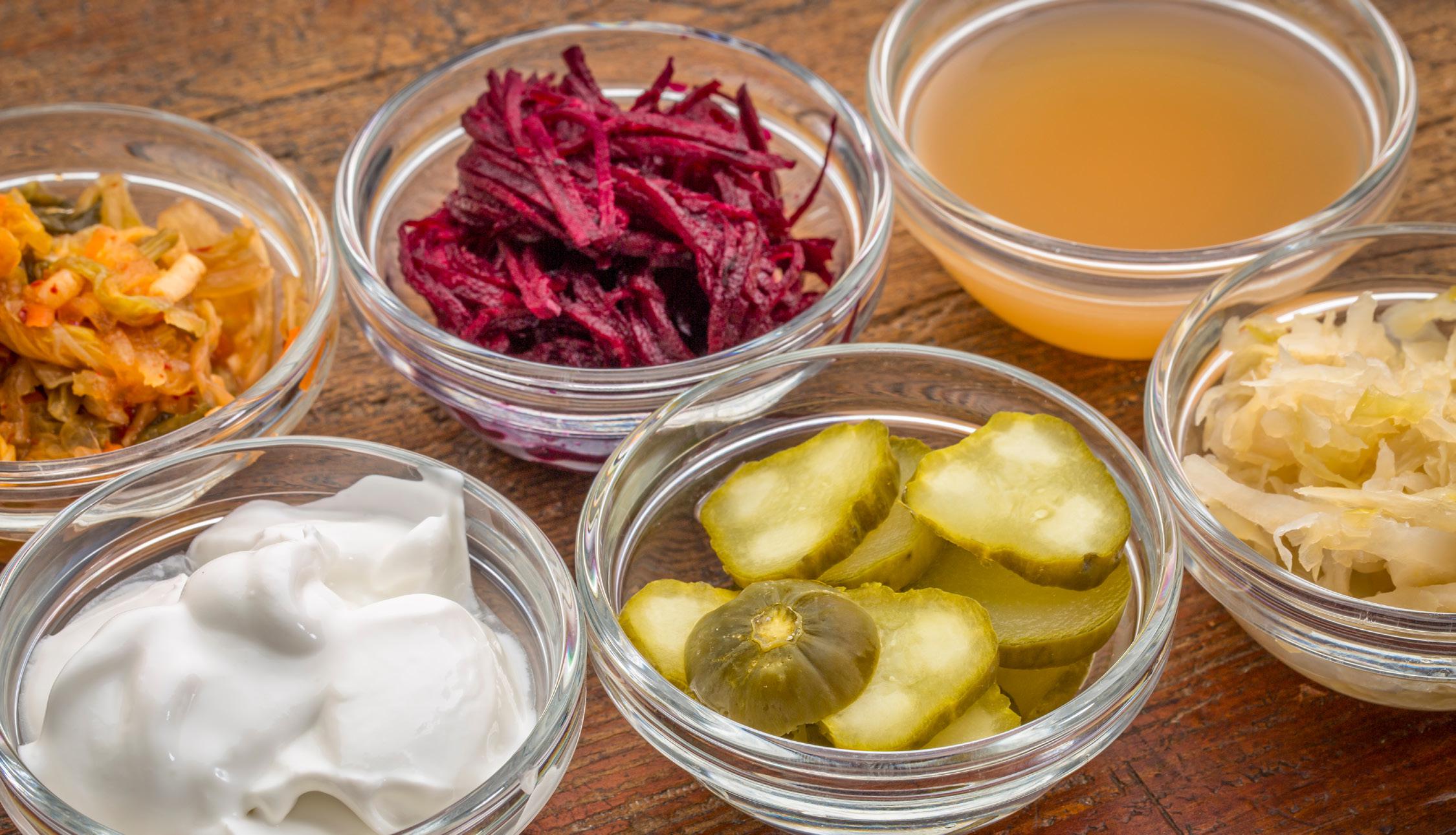
The Benefits of Prebiotics
Prebiotics Support Beneficial Microorganisms
Many of the important benefits of prebiotics derive from the fact that they can support beneficial microorganisms in your digestive tract.
Your gut microbiome contains trillions of bacteria and other microscopic living organisms, consisting of at least 1000 distinct species that have been identified so far[12][13].
Recent scientific perspectives indicate that the composition, diversity, and abundance of your microbiome appear to play a role in nearly every aspect of your body’s functioning, as well as your susceptibility to disease and other health problems — which can be a good thing or a bad thing, depending on whether or not you have a healthy microbiome[14].
According to the authors of a 2019 review published in the peer-reviewed Journal of Food Science and Technology, prebiotics may play a “crucial role in human well-being”[11].
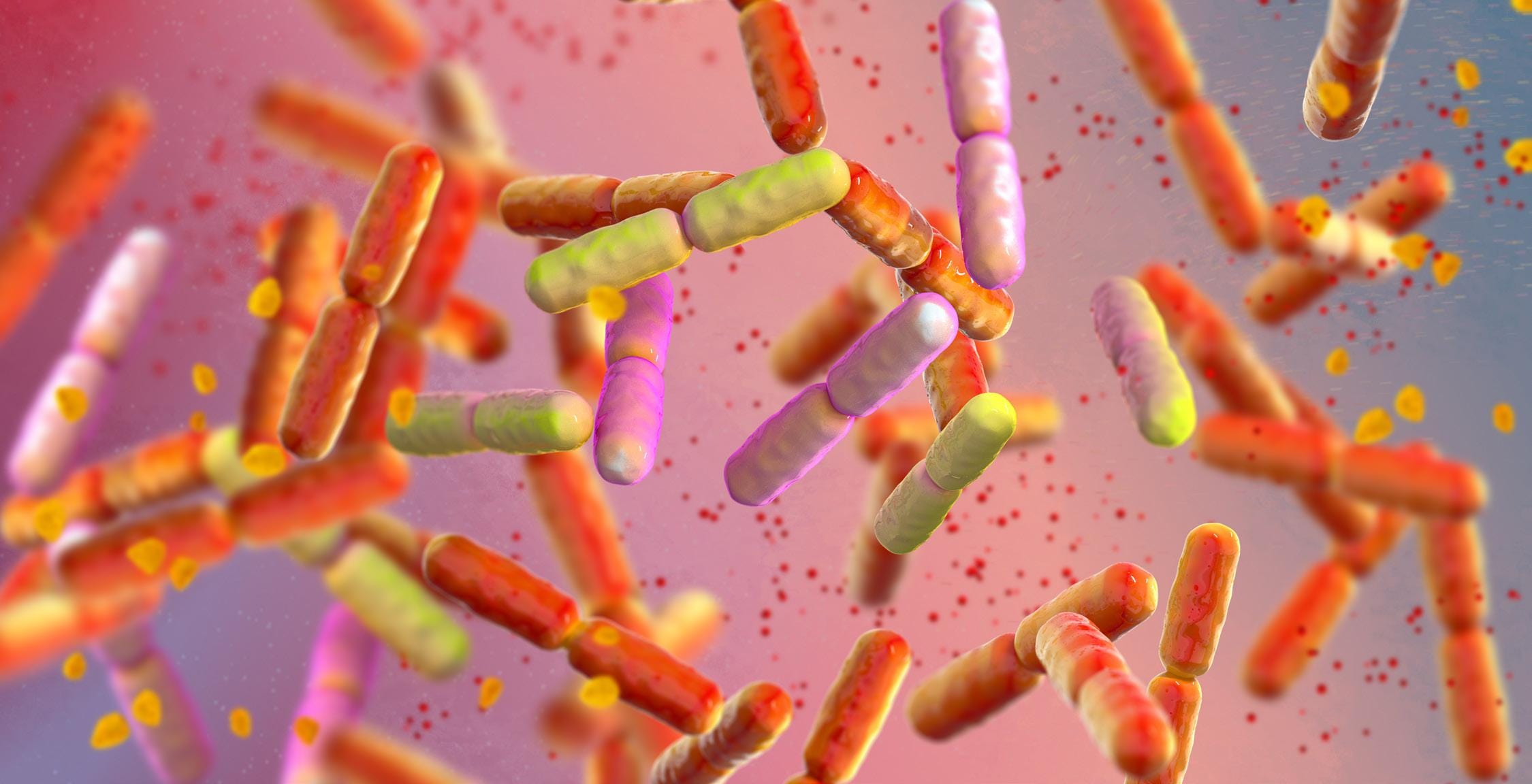
Unlike probiotic supplements containing live bacteria, which aren’t guaranteed to shift the balance of your microbiome, prebiotics can result in predictable and measurable shifts in your gut flora population, most significantly increasing beneficial strains such as Lactobacillus spp. and Bifidobacterium spp.[[7][15].
For example, a randomised, double-blind, placebo-controlled parallel trial with 44 participants published in 2019 found that partially hydrolysed guar gum, a type of prebiotic fiber, significantly shifted the ratio of bacteria in fecal samples, including increasing Bifidobacterium species[16]. Other studies have demonstrated similar results.
By feeding and supporting the survival of beneficial bacteria and other gut flora that are important for wellness, prebiotics in your diet may help support your overall health[3].
Prebiotics May Protect Against Pathogenic Bacteria
Similar to how beneficial bacteria support your health and wellness, pathogenic or disease-causing bacteria in your gut can be harmful or even fatal.
Until recently, doctors could usually treat opportunistic bacteria in the gut and elsewhere using antibiotics. Unfortunately, the prevalence of antibiotic use and overuse has resulted in the growth of antibiotic-resistant bacterial strains that can cause gut health problems and other serious health issues, and which often cannot be treated using antibiotic drugs[20].
Another problem associated with the use of antibiotics is that in some cases, individuals using antibiotics may actually experience lasting changes in their gut microbiome, including the death of beneficial bacterial strains and an increase in antibiotic-resistant, opportunistic, and pathogenic strains[21].Common examples of potentially harmful opportunistic bacteria include Escherichia coli, salmonella spp., campylobacter spp., and clostridium difficile.
According to a research paper published in the British Journal of Nutrition, consuming prebiotics supports beneficial bacterial species in the gut, especially Bifidobacterium spp. and Lactobacillus spp., with the potential to reduce or inhibit the action of some types of pathogenic and antibiotic-resistant bacteria[22]. The reduction of pathogenic species that inhabit the gut, particularly Firmicutes and Bacteroidetes, could confer a significant benefit to host health[15].
The research suggests that beneficial strains supported by prebiotics may have the potential to mitigate harmful strains by lowering the pH of the gut, “excreting natural antibiotics,” improving stimulation of the immune system, outcompeting pathogenic strains for nutrients, and blocking adhesion sites in the gut[22].
According to a 2015 in vitro study published in the journal Nutrients, prebiotic supplements like inulin could also possibly “lessen the adverse effects of antibiotics,” although this research is in the preliminary stage[23].
Prebiotics May Support Healthy Gut Function
Along with potentially shifting the ratio of the gut microbiome species favorably towards more beneficial strains, scientists are also investigating the possible ability of prebiotic foods and supplements to support healthy gut function in other ways.
For example, a double-blind randomised controlled trial published in 2019 found that otherwise healthy participants with a tendency toward diarrhea and symptoms of irritable bowel symptoms who received a prebiotic fiber supplement had a significant shift toward more solid stool formation[16].
Other studies suggest that prebiotics may support healthy digestion by[6]:
- Supporting the absorption of minerals and micronutrients, especially calcium, zinc, vitamin D, vitamin E, and iron[17][18]
- Reducing gastrointestinal fermentation of protein (which is associated with the production of ammonia and other potentially harmful byproducts), and
- Supporting mucin production, gut barrier function, and the integrity of the gut lining and tight junctions, which may help reduce gut barrier permeability
According to a 2017 paper published in Gut Microbes, one of the main ways prebiotics can support gut function is by producing short-chain fatty acids (SCFAs)[7].
SCFAs like butyrate, propionate, and acetate are natural byproducts of the metabolism of prebiotics by your gut bacteria, and in turn, cells lining the surface of your gut known as enterocytes and colonocytes require SCFAs — especially butyrate — as a fuel source[7][19].
Therefore, consuming prebiotics may support the function of enterocytes and colonocytes required for intestinal barrier function and nutrient intake.
Prebiotics May Support Your Body’s Natural Antiinflammatory Response
As we discussed in the last section, the bacterial metabolism of prebiotics in your gut results in the production of short-chain fatty acids (SCFAs) like butyrate, propionate, and acetate[7].
Not only are SCFAs supportive of healthy gut functioning, but they may also have benefits in other areas of your body besides the GI tract
According to a 2019 paper published in the peer-reviewed journal Food,
“Since SCFAs can diffuse to blood circulation through enterocytes, prebiotics have the ability to affect not only the gastrointestinal tract but also distant site organs”[11].
Research suggests that by feeding SCFA-producing bacteria in your gut, eating prebiotics or taking prebiotic supplements may help support your body’s natural anti-inflammatory respond inside and outside of your digestive tract[7].
Prebiotics May Support a Healthy Immune Response
Early evidence suggests that the use of prebiotics could support a healthy immune response in two different ways[24]:
- Indirectly, by supporting a balanced gut microbiome, which is essential for a healthy immune system.
- Directly, by modulating the expression of proinflammatory and anti-inflammatory cytokines, which are signaling molecules that play important roles in immune function
Because the effect of specific bacterial strains in the microbiome on immune function has already been studied extensively, more is currently known about the first mechanism[24].
But according to a 2018 paper, new evidence suggests that cells found in the GI tract that play a critical role in immune response and signaling, including regulatory T cells, effector T cells, natural killer cells, and B cells are “all influenced by prebiotics and the metabolites that are formed by their fermentation”[[6].
The exact mechanisms of how prebiotics could directly influence the immune system are currently unknown, but likely relate to fermentation metabolites like SCFAs[6].
Researchers are also currently investigating the potential of prebiotics and other, related microbiome interventions to reduce the risk of allergy and autoimmune disease in adults, children, infants, and pregnant or breastfeeding mothers[25].
Prebiotics May Support Cardiovascular Health
Prebiotics appear to support cardiovascular health indirectly, by supporting a healthy microbiome, as well as directly through the creation of short-chain fatty acids (SCFAs) and other beneficial metabolites of fermentation[11].
In particular, scientists are currently investigating the possibility that prebiotics could alter the composition of the microbiome and decrease the production of a harmful bacterial metabolite called microbiome-derived lipopolysaccharide (LPS), which is associated with an increased risk of cardiovascular disease[26].

Gut dysbiosis, an imbalance resulting from the overpopulation of “bad” bacteria, is also linked with the production of an inflammatory metabolite called trimethylamine-N-oxide (TMAO), which is associated in research with the development of cardiovascular disease[26]. Insofar as prebiotics might help reduce the likelihood of dysbiosis, some scientists believe they may be of use in mitigating the harmful effects of TMAO on the heart and cardiovascular system.
Prebiotics Could Support Brain Health and Cognitive Function
In a relationship known as the “gut-brain axis,” gut microbiota appear to communicate back and forth with the central nervous system, which could play a role in the development or prevention of mental illnesses including anxiety and depression[27].
That’s why researchers are currently investigating the potential of probiotics, prebiotics, and other gut health interventions to prevent or reduce symptoms of anxiety, depression, and other mental health issues[27].
According to a 2020 review,
“Gut dysbiosis may be one of the major factors in the pathogenesis development [sic] of schizophrenia, depression, anxiety, autism spectrum disorder (ASD) and multiple sclerosis, and inflammation is one of the common key processes among these pathologies...Altered gut microbiota composition can produce peripheral inflammation by the release of high levels of LPS [lipopolysaccharide] that induce the secretion of cytokines such as TNF-a and IL-1b...which can reach the CNS glia”[28].
The same authors note that early evidence in rodent models has shown promising results administering prebiotics for these issues, but definitive human evidence is currently lacking[28].
According to a 2019 review, “Preliminary evidence in human studies consistently support prebiotics doses of [about 5 to 10 grams per day] as safe to improve brain function (i.e., learning and working memory) and behavior (i.e., anxiety and mood),” but the studies are mainly limited to short durations (4-12 weeks) and focus primarily on healthy, young or middle-aged adults, so more research is needed to identify safe, effective doses, durations, and delivery methods, especially for older adults or individuals with health issues[29].
Prebiotics May Support Metabolic Health
Some studies suggest that gut health problems and imbalances within the gut microbiome could play a role in the development of metabolic disorders like obesity, metabolic syndrome, and type 2 diabetes, in which case the use of prebiotic supplements may be beneficial to support metabolic health by restoring balance to gut flora[30].
In a 2014 systematic review of the metabolic benefits of dietary prebiotics in human subjects published in the British Journal of Nutrition, 26 randomised controlled trials (RCTs) involving 831 total participants yielded the following results from prebiotic supplementation[30]:
- A significant increase in self-reported feeling of satiety (fullness) in healthy adults,
- Significant reduction in postprandial glucose, and
- Significant reduction of insulin levels.
However, the effects of dietary prebiotics on other outcomes including total energy intake, body weight, hunger hormones, insulin sensitivity, and inflammatory markers were contradictory, and the authors concluded that additional evidence is required before recommending prebiotic supplements to people with metabolic problems[30].
In a separate 2015 article, Barczynska et al. concur that prebiotics may potentially be of use for people with obesity by increasing levels of beneficial species, increasing feelings of fullness, and supporting balanced hunger hormones[31].
A 2021 randomised, single-blinded, placebo-controlled trial of 106 obese patients published in Brain, Behavior, and Immunity found participants who received 16 grams per day of inulin exhibited a moderate but significant increase in measures of emotional competence and cognitive flexibility[32]. Exploratory analysis of the data revealed that responders to treatment were more likely to have elevated levels of Coprococcus (a genus of butyric acid producing bacteria) at baseline as well as worse metabolic and inflammatory profiles at baseline.
The Best Prebiotic Foods to Eat
Research suggests that eating a diet containing foods high in fiber is beneficial for your health and can reduce the risk of health problems[33].
These effects are likely due in part to the ability of some types of soluble prebiotic fiber from whole foods to support a healthy microbiome and healthy gut function[33].
And according to some evidence, regular consumption of a diet high in prebiotic fiber from whole food sources may also increase the benefits of taking prebiotic fiber supplements compared to using the supplement without a history of a high-prebiotic-fiber diet[34].
Some types of prebiotics (such as inulin-type fructans, fructooligosaccharides, arabinogalactans, pectin, resistant starches, and polyphenols) are fairly easy to obtain from natural whole foods, while other types of prebiotics (including galactooligosaccharides and other milk oligosaccharides and guar gum), and especially manufactured prebiotics (like isomaltooligosaccharides), are difficult or impossible to obtain from whole foods and require supplementation to achieve meaningful amounts in your diet.
Here’s how you can get more prebiotics in your diet without the need for supplements.
Foods with Inulin-type Fructans or Fructooligosaccharides
Inulin and other inulin-type fructans (ITFs) are a type of soluble fiber prebiotic that occurs naturally in several edible fruits and vegetables[35]. The average daily consumption of ITFs in Europe is estimated between 3-11 grams, while in the US it may be between 1-4g[35].
Here are the most common foods high in ITFs[6][35]:
- Asparagus
- Bananas
- Burdock
- Chicory
- Dandelion root
- Garlic
- Jerusalem artichokes
- Leeks
- Oats
- Onions
- Soybeans
- Wheat
Foods with Arabinogalactans
Arabinogalactans, also called arabogalactans, galactoarabinans, and galactoarabinins, are part of the hemicellulose group of carbohydrates. They’re found abundantly in the primary and secondary cell walls of plants, and are usually covalently bonded with amino acids.
This type of prebiotic fiber is common in the human diet as they occur in seeds, leaves, roots, fruits, and sap of all higher plant families[36].
Foods and herbs especially high in arabinogalactans include[36]:
- Angelica acutiloba (angelica root)
- Baptisia tinctoria (wild indigo)
- Carrots
- Curcuma longa (turmeric)
- Leek seed
- Maize (corn)
- Pears
- Radishes
- Tomatoes
- Wheat
Foods with Pectin
Pectin is a polysaccharide starch that occurs in the cell walls of plants, including fruits and vegetables, as a structural component[37].This type of natural soluble fiber prebiotic consists of a polysaccharide backbone attached to d-galacturonic acid, a sugar acid.
You can obtain plenty of pectin by eating a diet high in whole food fruits and vegetables.
Pectin content of common fruits and vegetables (per 100g)[38][43]:
- Apples: 0.8g
- Apricots: 0.7g
- Avocados: 2.4g
- Bananas: 0.6g
- Beans 0.27-0.63g
- Blackberries: 1.4g
- Blueberries: 0.8g
- Cantaloupes: 0.3g
- Carrots 0.67-1.01g
- Cherries: 0.7g
- Figs: 1g
- Grapefruits: 0.6g
- Green grapes: 0.2g
- Guavas: 1.5g
- Kiwis: 0.7g
- Mangoes: 0.5g
- Oranges: 0.8g
- Papayas: 0.5g
- Peaches: 0.5g
- Pears: 1g
- Pineapples: 0.5g
- Plantains: 0.4g
- Plums: 0.4g
- Pomegranate arils: 2g
- Raspberries: 1.6g
- Strawberries: 0.7g
- Squash 0.67g
- Sweet potatoes 0.78g
- Watermelons: 0.1g
Pectin content of dried fruits (per 100g)[38]:
- Apricots 3g
- Cranberries 2.5g
- Dates (pitted) 2.5g
- Dried figs 4.3g
- Prunes 2.5g
- Raisins 1.7g
Foods with Resistant Starches
Resistant starches are a category of starches (polysaccharide or complex carbohydrates) that resist digestion in your upper GI tract. They’re not considered to be a type of dietary fiber, but offer similar health benefits to soluble fiber prebiotics.
According to a paper published in 2008 in the Journal of the American Dietetic Association and based on survey data, the average American intake of resistant starch is approximately 4.9 grams per day (range: approximately 3g-8g per day), which is lower than the 6 gram per day minimum recommended for health benefits[39].
Common sources of naturally occurring resistant starch include grains, seeds, legumes, raw potatoes, and unripe bananas[40].
You can also make your own resistant starch by cooking potatoes, rice, or grains, then cooling them in your refrigerator or freezing them and reheating before consuming. During cooling, a process known as retrogradation converts some of the digestible starches in these foods into resistant starches[41].
Resistant starch from retrogradation is an inexpensive, convenient, and effective way to boost your intake of prebiotics.
Foods with Polyphenols
Polyphenols are a class of antioxidants that includes catechins, anthocyanins, and proanthocyanidins. You may recognise these compounds as healthy components found in colorful fruits and green tea.
Along with their beneficial antioxidant properties, studies also suggest they can stimulate the growth of microorganisms recognised as prebiotic targets, as well as increase the production of short-chain fatty acids (SCFAs) including butyrate[42].
The best dietary sources of polyphenols are[42]:
- Blueberries, grapes, and other blue or purple berries for their anthocyanin and proanthocyanidin compounds,
- Green tea, especially matcha, for its catechin content, and
- Pomegranate arils for punicalagins and ellagic acid.
What Is the Best Prebiotic to Take?
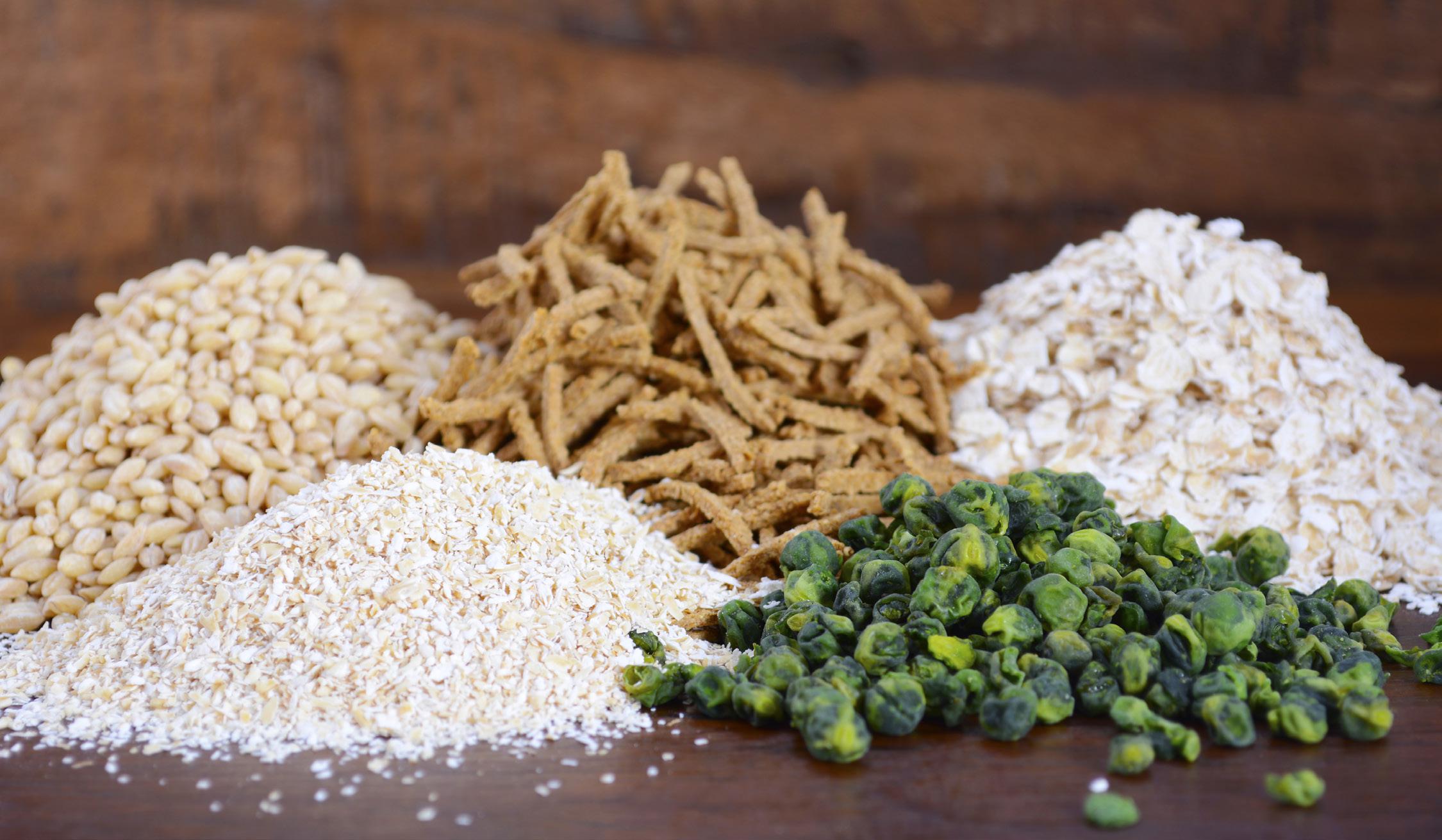
Eating a diet high in fresh fruits, vegetables, and other prebiotic-rich whole foods is likely adequate for many people to support a healthy microbiome, but prebiotic supplements can be a convenient option to boost general health, digestive health, anti-inflammatory support, or metabolic health.
The best prebiotic supplement to take depends on your health goals and budget, as well as how long you intend to take prebiotics. Here’s a breakdown of the best available options depending on your individual circumstances.
The Best Prebiotic Supplement for General Health
When it comes to supporting general health, prebiotic supplementsoffer significant benefits in terms of supporting a healthy microbiome and supporting the production of short-chain fatty acids (SCFAs)[10][11].
If you’re considering using prebiotics for general health purposes, you may want to experiment with a few different types to learn what works best for your body. You can also rotate between different supplements and adjust the dosage according to your observations.
For people who have never taken a prebiotic supplement before, we recommend considering the following types to start with:
- Galactooligosaccharides — Prebiotic GOS Supplement (100g)
- Resistant starch — Prebiotic Green Banana Resistant Starch (200g)
- Arabinogalactans — Thorne Arabinex Larch Extract (100g)
The Best Prebiotic Supplements for Digestive Health
If you’re specifically interested in supporting digestive health, galactooligosaccharides are a form of prebiotic that’s worth considering.
Galactooligosaccharides (GOS) are a natural form of prebiotic fiber found in milk and some plant foods in low concentrations. Like other types of prebiotics, they can support a healthy microbiome, but it’s difficult to obtain them in sufficient quantities through diet alone[44].
Compared to other types of prebiotics, galactooligosaccharides may be less likely to result in bloating, flatulence, and abdominal pain[45].
According to one study, the most beneficial dosages of galactooligosaccharides may be between 5-10g per day[46].
For those interested in experiencing the benefits of a high-quality GOS supplement, we recommend either the Bimuno Daily Prebiotic (GOS) Sachets or our house label Prebiotic GOS Supplement (100g).
The Best Prebiotic Supplements for Anti-inflammatory Support
Numerous studies suggest a link between consumption of prebiotics and the production of short-chain fatty acids (SCFAs) that can support your body’s natural anti-inflammatory pathways[47].
While most types of prebiotics can support the production of SCFAs, some prebiotics may also offer additional anti-inflammatory support through other mechanisms. In particular, evidence indicates that prebiotics that contain polyphenols or other antioxidants may provide extra anti-inflammatory support[48].
Here are our top recommendations for different types of prebiotics that are also high in polyphenols and other antioxidants:
- Japanese Organic Matcha Green Tea Powder (100g)
- Prebiotic Pure Kakadu Plum Powder (100g)
- Prebiotic Organic Pomegranate Extract (100g)
- Prebiotic Curry Powder - Hot (100g)
The Best Prebiotic Supplement for Metabolic Health
In a 2014 review of 26 separate studies, researchers examined the ability of prebiotic supplements to support metabolic health[30].
They concluded that the prebiotics showed promising results for supporting satiety (feelings of fullness), supporting healthy blood sugar levels, and supporting healthy insulin levels[30].
The majority of studies in the review used fructo-oligosaccharides (FOS), inulin, or a combination of the two prebiotic supplements. The most common dosages were 10-20 grams per day.
If you’re looking for a healthy, natural source of inulin, our 100% Pure Organic Chicory Root Fibre is an excellent source of prebiotic FOS inulin to support metabolic health.
The Best Budget-Friendly Prebiotic Supplements
While top-of-the-line prebiotic supplements like Biome Bliss or Thorne Fractionated Pectin can be extremely beneficial, there’s not always room in everyone’s budget for high-end prebiotics.
Fortunately, budget-friendly prebiotic supplements can also be helpful for supporting a healthy microbiome and achieving the other benefits we’ve covered in this article.
Our top recommendations for budget-friendly prebiotics are as follows:
Can You Take Prebiotics and Probiotics at the Same Time?
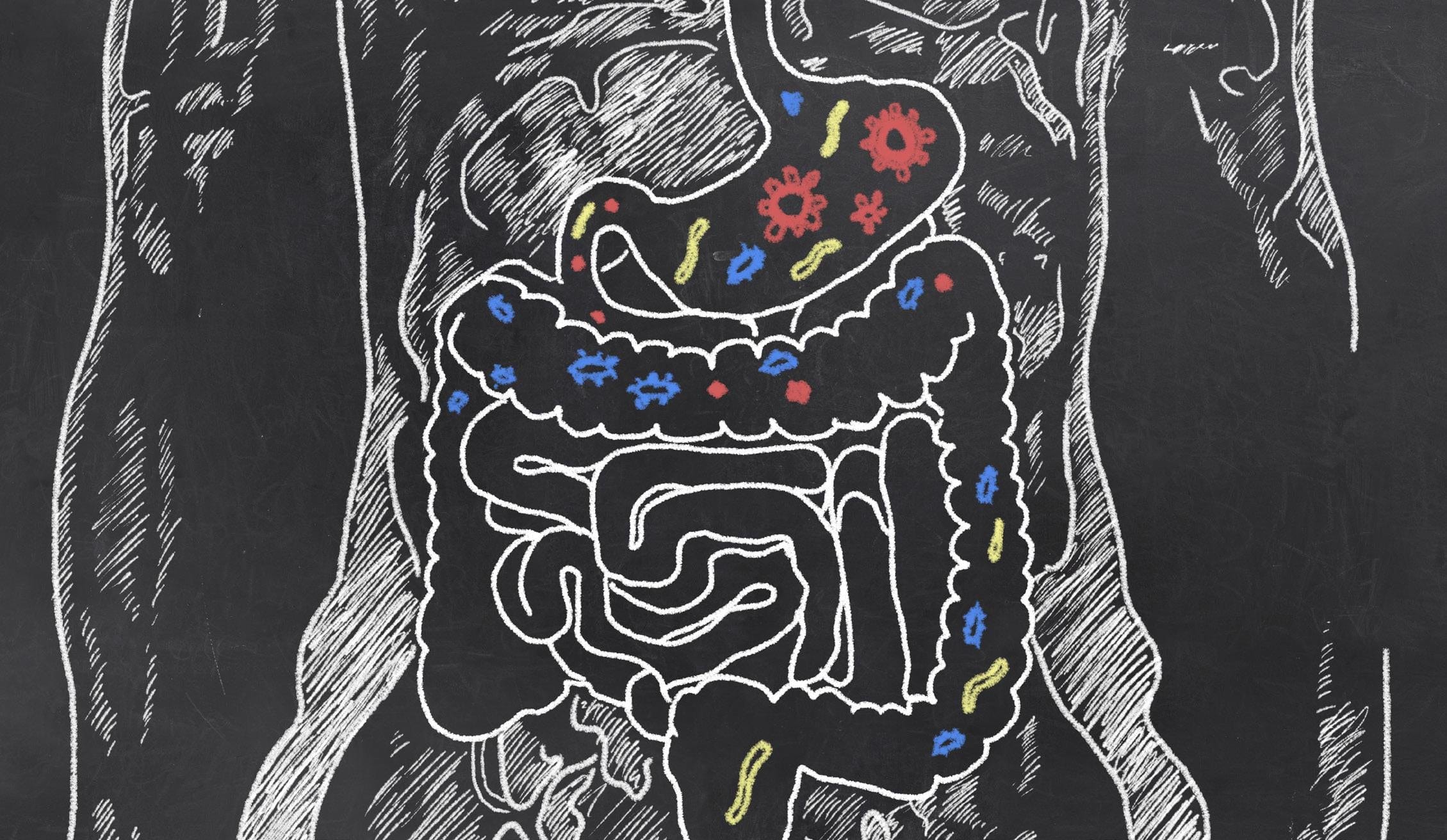
Yes, you can take prebiotics and probiotics at the same time, and some evidence suggests the combination may sometimes be more effective than either type of supplement by itself[15].
According to Cerdó et al. (2019), “Prebiotics may be used as an alternative to probiotics or as an additional support for them (emphasis added)”[15]. In other words, prebiotics can fulfill a similar function to probiotics, but can also be used to enhance their effects.
Some manufacturers also offer specialised probiotic products that contain specific probiotic microbial strains combined with synergistic prebiotics, known as synbiotics. The idea behind synbiotics is that by administering prebiotics along with probiotics, the probiotics can work better, and many experts endorse the concept[15].
Another advantage of combining the two types of supplements is that unlike taking prebiotics in the absence of live probiotics, the combination could help ensure that your body has the appropriate bacterial strain to utilise the prebiotic you’re consuming.
Because some studies show that people who lack certain beneficial bacteria strains in their gut microbiome are less likely to benefit from prebiotic supplements, this strategy could increase the effectiveness of prebiotics[49].
Not everyone needs to combine prebiotics with probiotics (or take synbiotic supplements), but here are some possible scenarios to consider:
- If you’re considering taking a prebiotic supplement for general health, you may want to add in a probiotic at the same time to potentially enhance the benefits.
- If you’re using traditional probiotic foods such as kefir, kombucha, or lacto-fermented vegetables fo for general health, a prebiotic supplement may enhance the benefits.
- If you’ve been taking a prebiotic supplement for a while and haven’t noticed any benefits, a probiotic supplement could help you get better results.
- Likewise, if you’ve taken a probiotic supplement without any perceived benefit, adding one or more prebiotics to your health regimen could be helpful.
- If you’re planning on taking a high-end probiotic for a specific purpose (such as VSL#3 or Vivomixx), adding prebiotics may help you achieve more benefits.
When Is It Best to Take a Prebiotic?

While there are currently no studies on the best time to take prebiotics, it’s probably best to take prebiotics at the same time every day. You can take them with a meal or on an empty stomach. Make sure to drink plenty of water any time you take prebiotics.
Because prebiotics may decrease the absorption of medications or nutritional supplements, it’s best to take them separately from any drugs or vitamins. If you take probiotic supplements, you can take them together with your prebiotics.
Some evidence suggests that taking non-coated probiotics with a meal could improve the survival of microorganisms, so if you plan to take probiotics together with prebiotics, it may be a good idea to take them both with a mixed meal that contains fats and carbohydrate[50].
What Happens When You Start Taking Prebiotics?

When you begin taking prebiotics, the species in your microbiome should begin to change immediately. Sometimes this may result in temporary side effects such as gas or bloating, although not for everyone. Most people tend to notice improvements in digestion, metabolism, and general health.
What are the Side Effects of Prebiotics?

According to clinical studies, the side effects of prebiotics are usually mild and temporary, and not everyone experiences adverse effects[51]. The most common issues are gas and bloating, although abdominal pain, diarrhea, and an increase in gastroesophageal reflux have been observed with higher doses[51].
Most of the side effects people experience from prebiotics are due to their osmotic (water-attracting) properties[51].
It’s possible, though not proven in studies, that mixing prebiotic supplements with water before taking them could help prevent osmosis-problems like diarrhea. If you experience unpleasant effects from prebiotics, you can also try reducing your daily intake, spreading your daily dose over several smaller doses, or taking prebiotics with meals instead of on an empty stomach.
Some evidence suggests thatgalactooligosaccharides (GOS) may be less likely to result in diarrhea or other adverse effects compared to other types of prebiotics[52].
If you take medications or other supplements (besides probiotics), take them apart from prebiotics, as it’s possible that prebiotics could decrease the absorption of drugs and supplements when taken together.
Who Should Avoid Prebiotics?
If you notice that taking prebiotics causes new symptoms that don’t go away on their own within a week or two, or seem to make existing GI symptoms worse, it’s wise to discontinue those supplements and consider changing to a different type of prebiotic.
While some studies show good results using prebiotics as part of a treatment plan for small intestinal bacterial overgrowth (SIBO), there’s also a possibility that prebiotics may contribute to the growth of non-beneficial bacteria[53][54]. Approach prebiotics with caution if you believe you may have gut dysbiosis, and speak to a health practitioner first if possible.
People who use a low-FODMAPs diet to manage IBS or other gut disorders should approach prebiotics with caution and use low-FODMAP prebiotics exclusively.
Are Prebiotics FODMAPs Friendly?
Prebiotics aren’t necessarily composed of FODMAPs. While all FODMAPs are technically considered prebiotics, there are other types of prebiotics that are low in FODMAPs. People who follow a low-FODMAPs diet may be able to safely take prebiotics includingguar gum, resistant starch, matcha powder, and acacia fiber.
Also, evidence suggests some prebiotics that technically contain FODMAPs, such as Bimuno and GOS may still be safe for people with IBS[55].
One way to learn the effects of prebiotics if you normally follow a low-FODMAPs diet is to introduce prebiotics to your regimen once your symptoms are under control during a “re-challenge” phase[56]. Consider working with a health practitioner who specialises in low-FODMAPs diets and IBS management if you want to explore this option.
When to Speak to Your Health Practitioner About Prebiotics
If you experience unusual or severe side effects from taking prebiotics, stop taking them immediately and speak to your health practitioner .
You should speak to a health practitioner before taking prebiotics if you have irritable bowel syndrome (IBS), inflammatory bowel disease (IBD), Crohn’s disease, or any other gut disorder.
And you should always ask your health practitioner before taking new supplements if you currently take prescription drugs or have a known medical condition.
The Takeaway
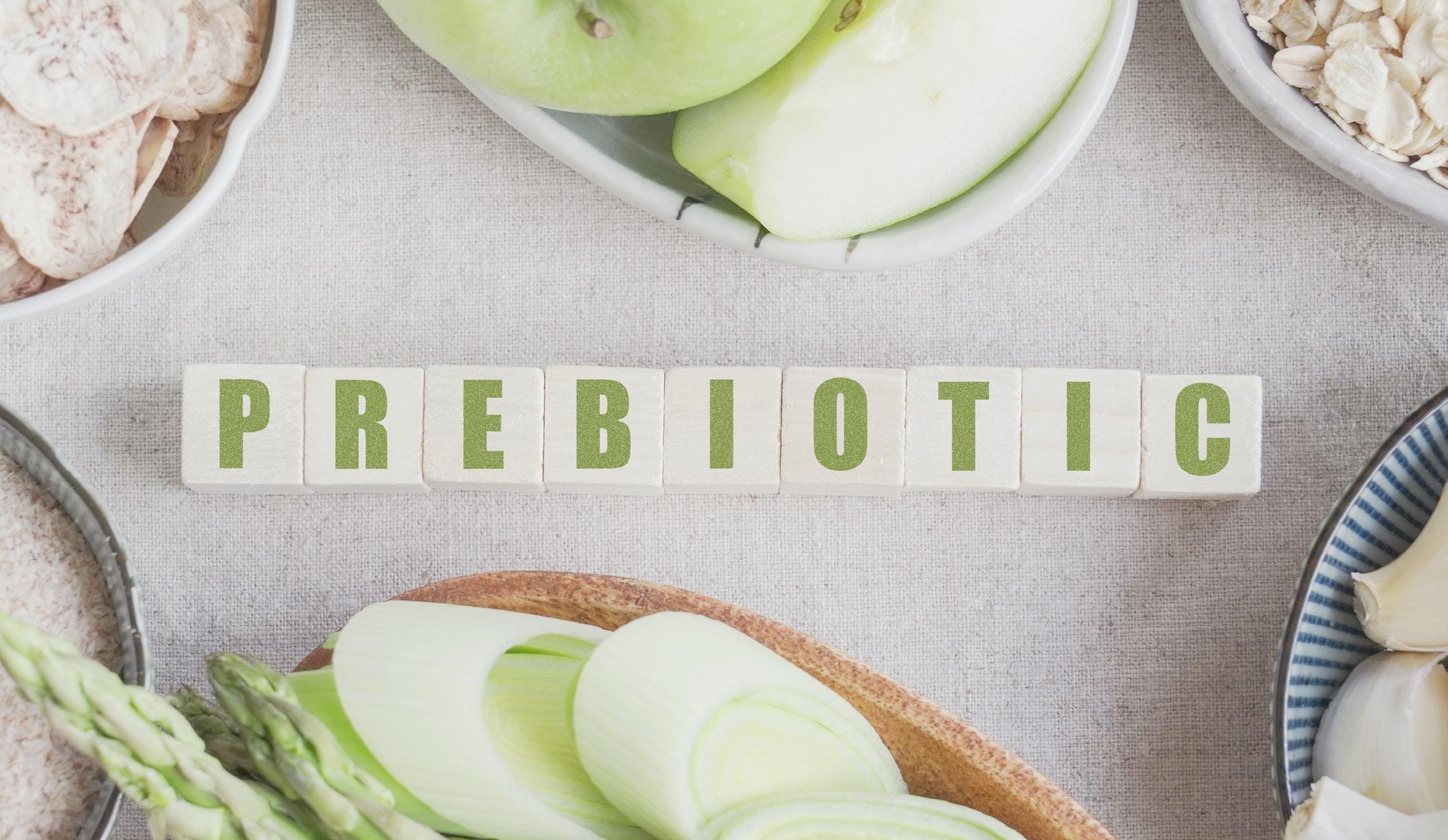
Prebiotic supplements and prebiotic whole foods can be used along with, or instead of, probiotic supplements.
Along with general health and gut health benefits, consuming prebiotics may also help support brain health, cardiovascular health, a healthy metabolism, a healthy immune response, and your body’s natural antiinflammatory response.
Most people should focus on eating a diet that’s high in natural whole food sources of prebiotics, especially fruits and vegetables high in inulin, pectin, resistant starches, and polyphenols.
Prebiotic supplements are an excellent option if you want faster results, would like to achieve more benefits from probiotic supplements, or need additional gut health support.
Our top prebiotic supplement recommendations include:
- Galactooligosaccharides, resistant starch, or arabinogalactans for general health benefits
- Galactooligosaccharides such as Bimuno sachets or prebiotic GOS powder for digestive health benefits.
- Matcha powder, plum powder, pomegranate extract, or prebiotic curry powder for antiinflammatory support.
- Chicory root powder as a source of FOS inulin for metabolic health benefits.
- Acacia fiber, partially hydrolysed guar gum, green banana resistant starch, or prebiotic curry powder on a more limited budget.
















